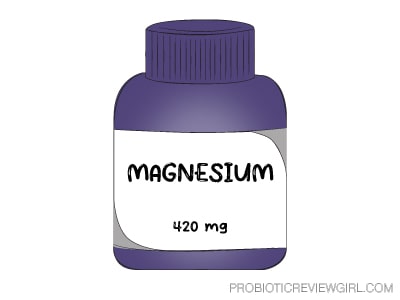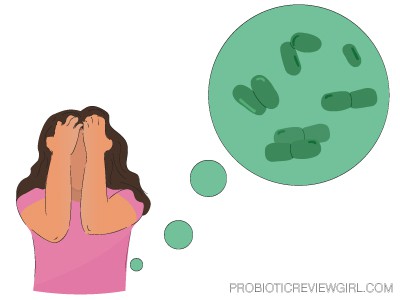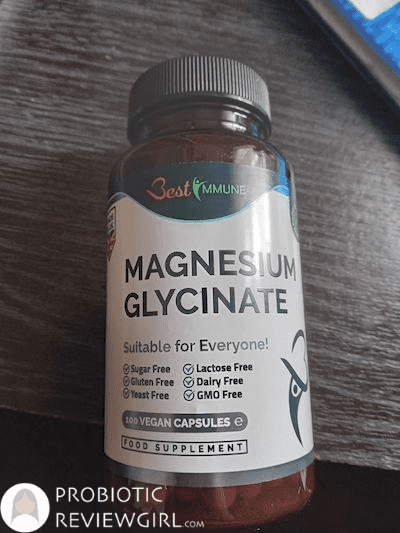Magnesium And Probiotics Study For Anxiety
Today, I will be reviewing a recent study on the effects of both Magnesium and Probiotics.
I will share my thoughts on why this combination may help with stress-related anxiety, fatigue and general well-being.
Magnesium can be sourced from many natural fresh foods but for some, taking higher doses in supplement form works better.
Magnesium And Probiotic Study
In this observational study from 2016 published in PubMed, the effects of Probiotics, Magnesium, and Vitamins were tested on humans who were noted the suffer from psychological stress.
To qualify as someone suffering from Psychological Stress, one first took a Perceived Stress Scale test and had to receive a score higher than 21. The questions were related to things like if they had felt nervous, irritated, upset, or out of their control in the last month.
242 participants were eventually included in the study with almost 80% of them being women. They were asked to take Magnesium, Probiotics, and Vitamins for a total of 1-month before then being asked to stop for 1-month.

Magnesium Supplement
Stress level scores were checked again at both of these points. Amazingly, after 1-month of taking Magnesium, Probiotics & Vitamins the stress level scores were 16% lower and after discontinuing the use of supplements the lower stress levels were still maintained.
It's also worth noting that in this study, there was a huge 38.1% reduction reported in fatigue and this makes sense since sources like Healthline have shown that prolonged stress can lead to chronic fatigue by leading to things like insomnia and decreased energy levels.
The study concluded that supplements did reduce stress levels in the participants in this study and even after discontinuing use, the reduced stress benefits remained.
Magnesium & Probiotics For Anxiety & Stress

Stress Can Lead To Anxiety
It was not mentioned in the study if the 242 patients also experienced symptoms of anxiety but both stress & anxiety can often go hand in hand with stress being a trigger for anxiety. According to Dr. Sambunaris an Anxiety & Depression specialist, when stress occurs for long periods, Cortisol & Corticotropin are boosted which can then lead to clinical anxiety.
A 2017 systematic review looked at the effects of Magnesium Supplementation on Anxiety & Stress and the conclusion was that there was evidence Magnesium could potentially help those suffering from mild anxiety but higher quality studies were needed as the evidence was inconclusive.
This 2021 study from the Neurobiol Stress journal showed that through the gut & brain axis, Lactobacillus Plantarum probiotic bacteria taken for 12 weeks could potentially alleviate both stress & anxiety symptoms in adults. The results were concluded from a placebo trial and stool tests were also taken to confirm the validity of the benefits that this probiotic bacteria had on symptoms of anxiety in the participants.
Can You Take Magnesium And Probiotics Together?
The 2016 study carried out by Francois A Allaert 1, Stephanie Courau, and Anne Forestier showed that both Magnesium can be taken together at the same time safely as no adverse effects were reported. You should not take Mageneium with Antibiotics which are different from probiotics.
I was able to find KetoPro, a supplement that contains 200mg of Magnesium Glycinate and a 10 billion CFU count of Bifidobacterium Longrum, Bifidobacterium Lactis, Lactobacillus Brevis, and Lactobacillus Plantarum. The supplement for sale uses FDA-approved ingredients so using both ingredients is safe for human consumption.
What Is Magnesium?
Magnesium is a type of mineral that can be found in whole grains, almonds, walnuts, peanuts, some fruits, and leafy greens. There are said to be upward of 11 types of magnesium with varying different benefits & side effects but here are 8 of the most popular.

Magnesium Glycinate Supplement
- 1Magnesium Citrate
- 2Magnesium Cholride
- 3Magnesium Oxide
- 4Magnesium Glycinate
- 5Magnesium Malate
- 6Magnesium Sulfate
- 7Magnesium Taurate
- 8Magnesium Stearate
It's thought that Magnesium is vital for muscle & nerve function and some people take it for benefits related to depression, anxiety, insomnia, migraines, and for general anti-inflammatory benefits. Magnesium is FDA approved as a dietary supplement but some people may experience side effects that include nausea, abdominal pain, diarrhea,
What Are Probiotics?
Probiotics are a type of bacteria that grow in fermented foods like Kimchi, Sauerkraut, Kefir, Miso Paste, and Kombucha. Once ingested they travel through the digestive tract and with the help of prebiotic fiber they settle and grow inside of the large colon eventually populating your microbiome.
Without certain types of probiotic bacteria in your microbiome, you may experience things like Anxiety, IBS, or even skin conditions like Psoriasis. The most popular type of probiotic bacteria is Lactobacillus and Bifidobacteria. Side effects from probiotics are common and include digestive symptoms but most of the time they pass after several weeks.
Final Thoughts
In recent years studies on Magnesium and Probiotics have been released but there still are not enough studies to make sure conclusions on the health benefits of taking both ingredients together.
From the studies available we do however know that taking them together will be safe for most people. Before taking magnesium and probiotics together you should first consult with your Doctor.
The content in this post is not medical advice and I am not a doctor. Probiotics and Magnesium won't help everyone and they may cause side effects instead of providing benefits.

Alicia Harper is a NASM-CNC Certified nutritionist and the editor of ProbioticReviewGirl.
After suffering from recurrent gut issues she spent years researching Probiotics and the microbiome.
She has tested 29+ different Probiotics and is a probiotics expert. As a probiotic fanatic, she has valuable knowledge to share with the world.